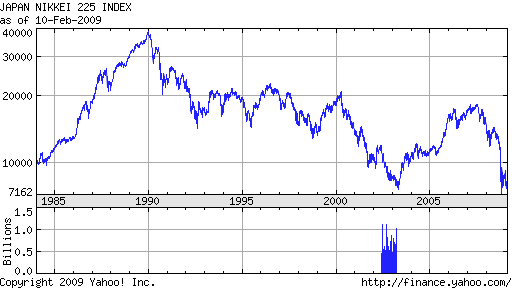Borrow and Spend = Crash and Burn
California has always been the trend setter for the nation but never more so than today as it totters on the edge of insolvency. The theory that States or Nations cannot go bankrupt due to their unlimited taxing powers has reached its limits as California voters have resoundingly rejected further tax increases. Without a Federal bailout, the State of California will be forced to make massive budget cuts. The illusion of a free lunch, paid for with borrowed money is now replaced by the harsh reality of a mortgaged future.
California may be in the spotlight today as the first major state to collapse financially, but most of the Nation’s other 49 states are not far behind. Tax revenues have declined in 45 other states by almost 13% in the first quarter and are likely to continue declining as both corporate and personal incomes decline. For the first time ever, the biggest source of revenue for the States is from the Federal Government. Almost all 50 States are at the precipice.
Given the absolute financial disaster occurring in almost every State, how long can it be before the ability of the US Government to pay its debts is called into question? The United States is not an abstract construction with a separate economic destiny, immune to events in the rest of the nation. The United States are 50 States joined as one. If nearly every one of the 50 states is an economic train wreck, the conclusion for Uncle Sam is obvious. Can the whole be greater than the sum of its parts?
Numerous doubts are being aired daily about the credit rating of the United States. Consider some comments from today:
For a warning about America’s fiscal future, consider yesterday’s news from Britain. United Kingdom stocks, bond futures and sterling all fell after Standard & Poor’s lowered the country’s credit outlook.
But in both the U.K. and U.S. today, the politicians in power equate government spending with growth. So on present course, Britain’s credit future could well be America’s in the coming years as U.S. spending soars.
Dollar Is Dirt, Treasuries Are Toast, AAA Is Gone
Several policy missteps suggest that investors should stop trusting — and lending to — the U.S. government.
“All currencies are being debased dramatically by their central banks at extraordinary speeds and so in relative terms it appears there is no currency problem,” In reality, however, paper money is highly vulnerable to a public catalyst that serves to acknowledge it is all merely vapor money.”
For the fiscal year ending Sept. 30, the Congressional Budget Office forecasts a record deficit of $1.75 trillion, almost four times the previous year’s $454.8 billion shortfall and about 13 percent of gross domestic product. Bear in mind that the target demanded of European nations wanting to join the euro was a deficit no greater than 3 percent of GDP.
David Walker, a former U.S. comptroller general, wrote in the Financial Times on May 12 that the U.S.’s top credit rating looks incompatible with “an accumulated negative net worth” of more than $11 trillion and “additional off-balance-sheet obligations” of $45 trillion. “One could even argue that our government does not deserve a triple A credit rating based on our current financial condition, structural fiscal imbalances and political stalemate,” he wrote.
Mr. Obama campaigned on “responsible fiscal policies,” arguing in a speech on the Senate floor in 2006 that the “rising debt is a hidden domestic enemy.”
However, Mr. Obama’s fiscally conservative words are betrayed by his liberal actions. He offers an orgy of spending and a bacchanal of debt. His budget plans a 25% increase in the federal government’s share of the GDP, a doubling of the national debt in five years, and a near tripling of it in 10 years.
US Officials Vow Fiscal Vigilance
Treasury Secretary Geithner and President Obama both acknowledge that out of control spending could eventually lead to default, credit market rejection and a lower standard of living as the cost of debt servicing destroys our standard of living.
Geithner Pledges To Cut Deficit
May 21 (Bloomberg) — Treasury Secretary Timothy Geithner said the Obama administration is committed to reducing the federal budget deficit after concerns rose that the U.S. debt rating may eventually be threatened with a downgrade. He added that the target is reducing the gap to 3 percent of gross domestic product or smaller, from a projected 12.9 percent this year.
– the co-chief investment officer of Pacific Investment Management Co., said the U.S. “eventually” will lose its AAA grade.
Obama Says US Long-Term Debt Load “Unsustainable”
May 14 (Bloomberg) — President Barack Obama, calling current deficit spending “unsustainable,” warned of skyrocketing interest rates for consumers if the U.S. continues to finance government by borrowing from other countries.
“We can’t keep on just borrowing from China,” Obama said at a town-hall meeting in Rio Rancho, New Mexico, outside Albuquerque. “We have to pay interest on that debt, and that means we are mortgaging our children’s future with more and more debt.”
The Future Reality
The President and Treasury Secretary say what they have to say. The reality is that the present course of unlimited credit expansion, quantitative easing, bailouts and massive deficit spending will continue in an attempt to re-inflate asset values and stimulate spending. The Government will not accept alternatives that they view as being worse – deflation and a collapsing economy with civil unrest. California will be bailed out like everyone else.
The course of action for long term wealth accumulation under the present circumstances seems obvious. Avoid an over concentration in paper assets (debt) that can be produced by governments in infinite quantity at zero cost. Diversify into assets backed by 1) real services or goods that there will always be a demand for and 2) natural resources such as commodities, oil and gold.


